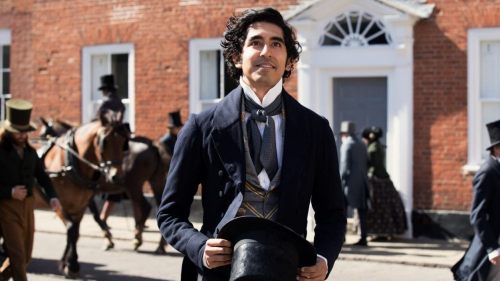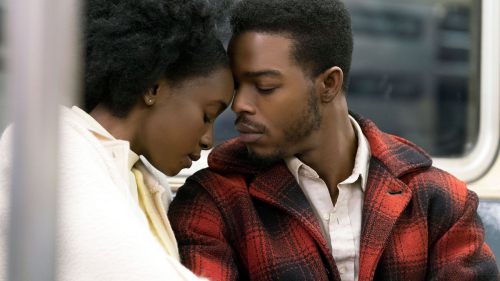TIFF 2018 REVIEW: IF BEALE STREET COULD TALK Is Another Barry Jenkins Masterpiece
With universal, rapturous acclaim and a best picture Oscar under his belt for his astonishing second feature Moonlight, it feels like all eyes have been fixed on Barry Jenkins to see what he’ll do next. Considering the content of that film, it wasn’t too surprising that he’d decide to adapt work by James Baldwin, but that doesn’t make it any less of an easy task. Throughout his essays and novels, Baldwin often wrote with simmering anger towards the oppressiveness of living in the United States intertwining with his deep affection for his friends and family, a complex mood to capture. But perhaps we never should have had any doubt, because Jenkins has delivered yet again.
If Moonlight was a story of romance hindered by toxic masculinity, If Beale Street Could Talk is expressly about black romance hindered by institutional racism. Set in ‘70s Brooklyn, the film follows the lives of “Tish” Rivers (Kiki Layne), and her slightly older boyfriend “Fonny” (Stephan James), a sculptor. Jenkins handily matches the former’s epic scale and aching emotion - where Moonlight jumped years forward at a time through the life of one boy, In Beale Street Could Talk goes a bit broader, bouncing between different perspectives as well as several different periods of time; but it feels no less intimate.
As the film opens, we find out that not only is Fonny in prison, but the two are (unexpectedly) expecting a baby. From there the film jumps between past and future, telling the story of both their coupling and Fonny’s imprisonment, and how it affected everyone around them. Jenkins takes great care to explore their familial bonds as much as their romantic one. Fonnie and Tish’s relationship is filmed with great warmth, and Stephan James and KiKi Layne bring incredible pathos to both characters. Even without Baldwin's words to guide us as to what they’re feeling, every glance exchanged between the two feels like it contains multitudes.
It helps that the film is full of performances that are as rich as the film’s texture, with particular supporting highlights in soulful turns from both Bryan Tyree Henry (who, between this and Widows, is having a great TIFF) and Regina King - the latter of whom completely owns one of the film’s standout bits, a vulnerable, moving moment in isolation in a quick digression from the focus on Tish and Fonny’s relationship.
There’s an incredibly strong use of colour in both the costume and set design throughout the film, full of rich greens and deep yellows. What particularly stands out is the way in which black skin is lit. James Luxton and Barry Jenkins continue to prove that they’re masters at it, using low light to make dark skin look even darker, and give each character a radiant glow, making the harsh light of the prison feel even harsher, the beauty of free black bodies versus the tyranny of those put behind bars, behind glass.
The swooning score by Nicholas Britell harkens back to the hypnotic strings of his Moonlight soundtrack, this time infused with sounds of jazz instead of the chop-and-screw technique used for that last film. As in something like In The Mood For Love, the period details almost fade into the background, the film evoking a nostalgic mood without overdoing it on the popular music. It almost feels like the couple’s interactions take place outside of time. But harsh reality eventually intrudes, with the film frequently snapping back to Tish’s visits to Fonny in prison. Reality intrudes in other ways too - as Jenkins works archive photography into the film, often of prison labour or police brutality in nondescript images from America’s disgraceful past.
If the film’s romance and subtle period details recall the work of Wong Kar-wai, the jazz-inspired soundtrack, emotive use of archive photos and confrontational looks into the camera recall the films of Spike Lee - If Beale Street Could Talk owes as much to those filmmakers as it does to Baldwin. The photos in particular connect the narrative to a larger point - one hinted at in the Baldwin quote from the opening of the film, “that every black person in America was born on Beale St” - implying a shared heritage, and the idea that Tish and Fonny’s tragic story is far from an isolated case.
Jenkins weaves together poignant cultural commentary with an intimate, almost painfully earnest romance that feels doomed from its very inception - but it’s not a relationship without hope. In fact, despite the gloom and injustice that’s put upon the couple, the film carries a note of optimism throughout. Baldwin himself said of the novel that “on the way to optimism, there has to be some despair”, and Jenkins calibrates this feeling just right, nailing all the complexities of these characters, the little things that make them who they are.
In short, If Beale Street Could Talk continues Barry Jenkins’ hot streak. It’s an incredibly emotive, personal film with consequences that speak to a larger ill at America’s heart, an earnest love story set against a background of racial injustice. Adapting one of the most important voices in the 20th Century is no minor task. And yet, Jenkins almost makes it look easy. If Beale Street Could Talk expertly translates Baldwin’s words to film and imbues them with a renewed spirit - with all of the complexities and emotions of the black experience in America, and the love and joy, the frustration and hopelessness, the despair and optimism that this entails.



